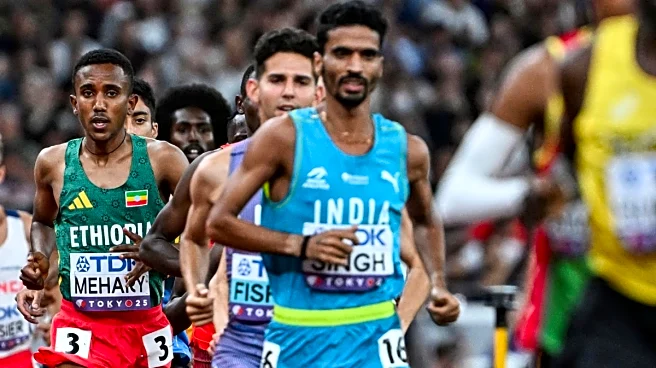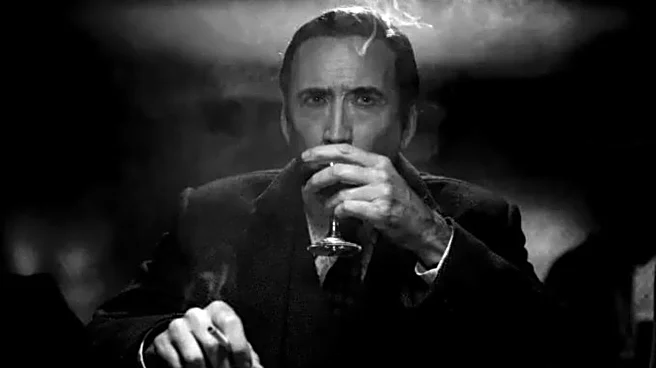Gulveer Singh’s brave running and refusal to let his challenge wither saw him nearly emerge as the unlikely hero of the night in the World Athletics Championships in Tokyo on Friday. For more than 13 and a half
minutes, he kept trying hard to remain among the top eight finishers in the men’s 5000m heats but, in the end, that was not enough for him to complete the hero act.
He finished ninth in 13:42.34, a mere 0.19 seconds behind the eighth-placed Jakob Ingebritsen, gold medalist from the Budapest 2023 World Championships. He had backed his ability to produce a decisive kick but came a cropped against the fast finishing Norwegian and Frenchman Yann Schrub. Without greater tactical sense, bravery alone did not suffice on Friday.
On a night when Javelin Thrower Annu Rani’s best effort of 55.18m was good only for 29th place overall and belied her own belief that she had her best reserved for the World Championships, it was left to Gulveer Singh to infuse some spark into the Indian campaign with his aspiration of making it to the 5000m final.
He has had a memorable season and would have loved to cap it by featuring in Saturday’s medal race. While he can look back and take pride in setting National Records in the 5000m and 10000m on February 21 and March 29 respectively and in winning the Asian Championships double, he would rue missing the chance to place the cherry on the cake by running the 5000m final.
Gulveer Singh will have ample time to sit with his coach and review the race. Yet, when he finished the race and walked to the mixed zone to speak with two Indian journalists, he did not run replays of the race in his mind. “What do I say? The race was not in keeping with the kind of training I had done,” he said. “I am disappointed. More so, since there are so many people backing me.”
His race was reminiscent of Avinash Sable appearance in the final of the Eugene 2022 World Championships where the 3000m Steeplechaser sat back, waiting for the others to crank up the pace. In what was the slowest men’s Steeplechase in the World Championships, Sable was unable to shift gears when others made their move.
It may be a bit uncharitable to point out that since the race was slower than the first heats, where Isaac Kimeli (Belgium) won in 13:13.06 and the eighth placed Eitenne Daguinos (France) clocked 13:14.87, Gulveer Singh could have taken the initiative and controlled the race pace. But then, it is not a possibility that should be overlooked.
Gulveer Singh was game enough to discuss that. “In the major competitions, no runner likes to take the initiative through the distance, and it boils down to being part of the bunch and seeing who does best over the last 150 or 200 meters. In the World Championships, the race pace does not really matter because everyone is fighting for a medal.”
Even if laced trepidation, Indian hearts in the Japan National Stadium swelled with pride to see a distance runner from their nation figure in the lead group for a considerable time. After all, Gulveer Singh is only the third Indian male athlete to run the 5000m in World Championships history after Bahadur Singh (1993 and 1995) and G Lakshmanan (2017).
By the time the race was halfway through, Gulveer Singh had dropped to ninth place. He increased his pace to rise to fourth spot after 4km but with a number of runners with more devastating kicks than his breathing down his neck, it was clear that he was going to be challenged. Yet, there was hope that he would hang in there and earn a place in the final.
With 100m left, he glanced over his left shoulder to see if someone was on his heels. As his luck would have it, Norwegian defending champion Jakob Ingebrigtsen and France’s Yann Schrubb sped past him on the outside to claim the last two final spots. An aware runner may have looked at the giant screen instead of looking back. A more aware athlete would have continued sprinting.
In the end, the heart reached out to the 27-year-old as disappointment was writ on his face. “It does not matter whether I missed the final by one spot or nine,” he said. “The fact is that I did not run a race in keeping with the training I did. The plan was to run well enough to make it to the final, but I was unable to achieve that.”
With the Commonwealth Games and Asian Games next year, it would be important for the ecosystem to help him get smarter in terms of race intelligence with greater tactical awareness. The intrinsic honesty in his emotions makes hope spring that with more experience of racing at this level, he could figure higher in the 12 and a half lap World Rankings and run a global final.




/images/ppid_59c68470-image-177095519003435839.webp)

/images/ppid_59c68470-image-177095526141973949.webp)
/images/ppid_59c68470-image-177095515658937155.webp)
/images/ppid_59c68470-image-177095522379556946.webp)
/images/ppid_59c68470-image-177095508098299086.webp)
/images/ppid_59c68470-image-177095503691894896.webp)
/images/ppid_59c68470-image-177095511972783068.webp)
/images/ppid_a911dc6a-image-177095525072836974.webp)

/images/ppid_a911dc6a-image-177095464341460939.webp)